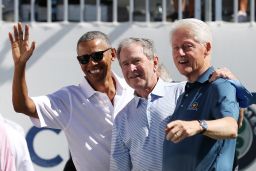The Presidents club is turning on its newest member.
Breaking the code of silence that retired commanders in chief normally maintain about their successors, both George W. Bush and Barack Obama delivered clear jabs at the current occupant of the Oval Office on Thursday.
President Donald Trump, however, likely didn’t feel a thing. His entire political brand stands as a living rebuke to the political establishment that both men once led and to the traditionalists who believe his behavior is eroding the prestige of the presidency itself.
While neither Bush nor Obama mentioned Trump by name or referred to his claims this week that he had been more attentive to relatives of slain US service members than they were, they used coincidental events to register their alarm with Trump’s politics.
In New York, Bush delivered a strong indictment of Trump’s populist nationalism, condemning trade protectionism and bemoaning how politics had fallen prey to “conspiracy theories” and “outright fabrication.” He also warned of the impact of “bullying and prejudice” in public life. It was not hard to work out who he was talking about in one of his most vehement interventions in politics since he left office in January 2009.
Obama, at the first campaign appearances of his post-presidency, warned about the tone and content of Trump-style politics – after spending several weeks watching Trump undermine his proudest achievements including the Iran nuclear deal and the Affordable Care Act.
Apparently referring to the President’s handling of racial violence in Charlottesville, Virginia, and sluggish condemnation of white supremacists, Obama lamented the “same old politics of division” while campaigning for New Jersey Democratic gubernatorial candidate Phil Murphy.
“Some of the politics we see now, we thought we had put that to bed,” Obama said. “That’s folks looking 50 years back. It’s the 21st Century, not the 19th Century.”
In a second campaign stop in Virginia, Obama took aim at the methods Trump used to win the election.
“We’ve got folks who are deliberately trying to make folks angry – to demonize people who have different ideas; to get the base all riled up because it provides a short-term tactical advantage,” Obama said, again without specifically naming the President.
There’s no doubt that Obama and Bush have been dismayed by some of Trump’s antics in office. Both men were deeply conscious of the messages their own conduct and rhetoric projected at home and abroad. Both spoke about how they viewed the presidency as a public trust that was theirs for a short time and was not a vehicle for personal glorification.
Trump, by contrast, seems unimpressed by the conventions, heritage and protocols of the presidency. His critics have constantly complained that he is damaging the office of the presidency itself.

The President has not so far not responded to his predecessors’ critiques, though a Twitter blast cannot be ruled out.
While such obvious criticism of an incumbent president by ex-presidents is extraordinary it is also a metric of the highly unusual times and the shock to the political system embodied by Trump’s election.
Republican strategist and CNN commentator Ana Navarro noted the tradition of former presidents keeping out of the spotlight, but added: “enough is enough.”
“There is a lot of people that are frustrated, that are heartbroken, that are sad. “It is time up to speak up and act up and have a position,” she said.
The political impact of the Bush and Obama criticism of Trump is likely to be limited. By definition, former presidents lack the influence they once had.
Bush’s Republican Party, featuring “compassionate conservatism,” thwarted hopes of comprehensive immigration reform and democracy promotion at the point of a gun overseas is long gone.
Obama’s electoral coalition rewrote the rules of electoral politics in 2008 just as Trump did in 2016. Yet the 44th President was never able to transfer that magic formula to anyone else – as the failed election campaign of Hillary Clinton demonstrated.
In fact, for Trump’s supporters, and perhaps for the president himself, the reappearances of Obama and Bush on Thursday may have seemed less of a rebuke than validation.
After all, what better endorsement could there be of an anti-establishment campaign targeting Washington elites and a broken political system, than running foul of the two previous presidents from each political party?
It seems unlikely that once he leaves office he will settle into the chummy former presidents club and be seen yukking it up at the President’s Cup golf tournament, as Bush, Obama and Bill Clinton were recently. It’s almost impossible to believe, for instance, given their history, that he will show up – or be invited – for the opening of his successor’s presidential library.
Trump also has a torrid personal history with both men, dating to his Birtherism campaign against Obama, and the defanging of Bush’s brother Jeb, the establishment GOP’s top hope for the nomination in the 2016 race.
Breitbart News, which is run by former top Trump political adviser Steve Bannon, summed up the attitude of many of the President’s supporters with its headline about the 43rd president’s speech: “Bush dynasty’s firstborn emerges to bash Trump, ‘nativism.’”
The critique by Bush and Obama also obscured the inadvertent contribution both men had made to the rise of Trump.
It was the long decade-and-a-half of war launched by Bush, especially the invasion of Iraq on the basis of never-found weapons of mass destruction, that helped foster the current climate of isolationism among Trump supporters.
Obama will be remembered by history for bringing the nation back from the worst financial crisis in 70 years, that erupted late in Bush’s second term. But the recovery over which he presided left many workers, in traditional industries behind, especially in Midwestern battleground states that proved fertile ground for the Trump’s winning economic message last fall.
CNN’s Eric Bradner contributed to this story


